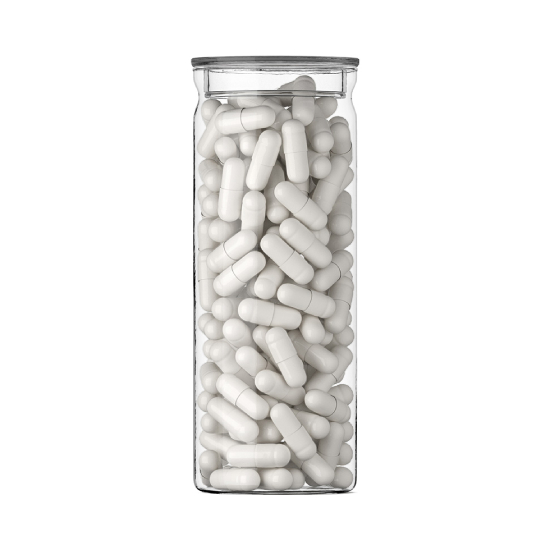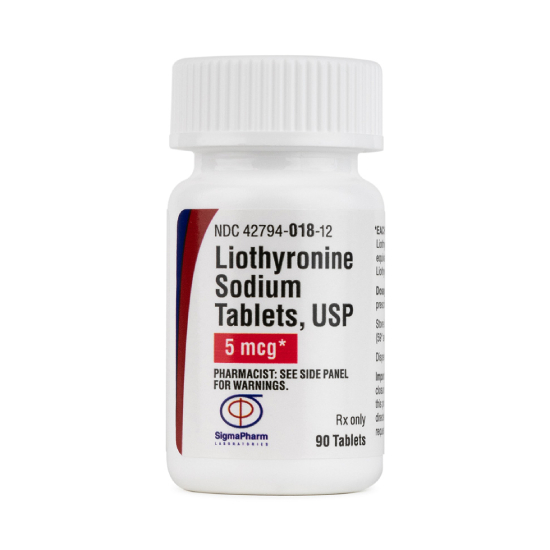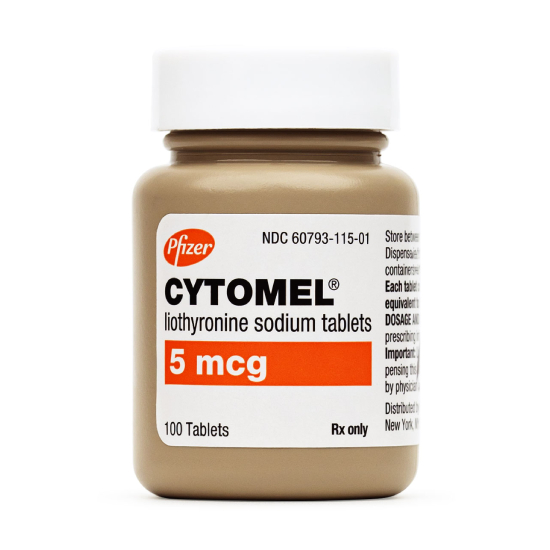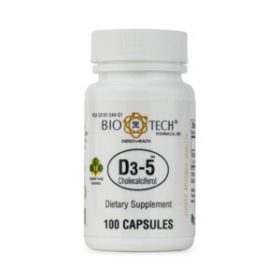This product is available solely through our 503A Compounding Pharmacy, ensuring personalized care and precision in every order. Please note that a valid prescription is required for purchase. If you do not have an account, please contact us.
Liothyronine Sodium Capsule (Slow Release) (Each)
Liothyronine Sodium Capsule (Each) †
Liothyronine Sodium Tablet (Each) †
† commercial product
Liothyronine (L-T3)
Liothyronine is a synthetic form of the thyroid hormone triiodothyronine (T3), used to treat hypothyroidism and other thyroid-related conditions. It’s available in both oral and injectable forms. It’s also used to suppress TSH in goiters and as a diagnostic tool. The injectable form is used in emergency cases like myxedema coma.
Liothyronine works faster than levothyroxine (T4), which must be converted into T3 in the body. Because of this, it’s recommended for severe cases, though it may be more cardiotoxic than levothyroxine. Levothyroxine is generally preferred for long-term management, but some studies suggest partial replacement with liothyronine may improve mood and cognitive function.
Mechanism of Action
Thyroid hormones, including T3, regulate metabolism by increasing oxygen consumption, energy production, and cellular function. T3 is four times more potent than T4 but circulates at lower levels.
Conversion of T4 to T3 can be inhibited during stress or illness, diverting it into an inactive form. Once active, T3 binds to nuclear receptors, influencing gene expression and metabolism, with much greater affinity than T4.
Physiological Effects
Liothyronine increases heart rate, cardiac output, and oxygen use while reducing vascular resistance. It also boosts respiratory rate, digestion, and consciousness recovery. By enhancing protein and carbohydrate metabolism, it helps correct hypothermia and supports energy production through increased mitochondria activity. Effective treatment restores normal TSH levels in patients with hypothyroidism.
Mechanism of Action
Thyroid hormones, including T3, regulate metabolism by increasing oxygen consumption, energy production, and cellular function. T3 is four times more potent than T4 but circulates at lower levels.
Conversion of T4 to T3 can be inhibited during stress or illness, diverting it into an inactive form. Once active, T3 binds to nuclear receptors, influencing gene expression and metabolism, with much greater affinity than T4.
Liothyronine – Precautions and Special Considerations
Liothyronine should be used carefully in patients with allergies to any ingredients or with conditions that may be worsened by thyroid hormones. It’s contraindicated in untreated thyrotoxicosis and adrenal insufficiency, as thyroid hormones can increase the body’s demand for adrenal support and trigger adrenal crisis.
Before starting treatment, secondary causes of hypothyroidism, such as pituitary or adrenal disorders, should be ruled out, as these conditions may be exacerbated. In cases of heart disease—including angina, arrhythmias, or recent heart attacks—liothyronine should be used cautiously with lower doses and slow titration. Overuse can overstimulate the heart and lead to serious complications.
Older adults and patients with kidney problems are more sensitive to liothyronine and may require lower doses. In diabetes, thyroid therapy can affect blood sugar levels, so monitoring is essential. Liothyronine is not recommended for weight loss, as higher doses can be dangerous.
For severe cases like myxedema coma, therapy should start with low doses and be paired with glucocorticoids. Careful management of fluids and temperature is crucial, as rapid rewarming or excess fluids can worsen the patient’s condition.
During pregnancy, liothyronine is generally safe when needed, and treatment should not be stopped. Thyroid levels should be monitored every trimester. The drug is also generally compatible with breastfeeding, though monitoring is advised.
Long-term or high-dose use may reduce bone density, especially in postmenopausal women, so the lowest effective dose should be used.
✅ Key Interactions of Liothyronine (L-T3):
Cardiovascular drugs and conditions
Increased heart stimulation: Liothyronine raises heart rate and cardiac output, so it can interact with drugs like beta-blockers, anti-arrhythmics, or other sympathomimetic agents, potentially worsening heart conditions such as angina or arrhythmias.
Caution in heart disease: Patients with uncontrolled hypertension, coronary artery disease, or a history of heart attacks are at higher risk of complications. Doses should be lower and titrated slowly.
Adrenal insufficiency
Liothyronine increases the demand for adrenal hormones. In patients with untreated adrenal insufficiency, it can trigger adrenal crisis. Corticosteroids may be needed when treating such patients.
Diabetes and glucose control
It may alter the effectiveness of antidiabetic medications, requiring closer monitoring of blood glucose during therapy initiation or discontinuation.
Other endocrine disorders
Administration in patients with pituitary or adrenal diseases can unmask or worsen symptoms.
Obesity treatment
Using high doses of liothyronine for weight loss, especially with appetite suppressants, may result in severe toxicity.
Pregnancy and breastfeeding
Pregnancy increases thyroid hormone requirements, so monitoring is needed. It’s generally safe if managed properly but must be used with caution.
Long-term effects
High or prolonged use, especially in postmenopausal women, may lower bone mineral density, increasing osteoporosis risk.
Physiological Effects
Liothyronine increases heart rate, cardiac output, and oxygen use while reducing vascular resistance. It also boosts respiratory rate, digestion, and consciousness recovery. By enhancing protein and carbohydrate metabolism, it helps correct hypothermia and supports energy production through increased mitochondria activity. Effective treatment restores normal TSH levels in patients with hypothyroidism.
FDA pregnancy risk category A includes Liothyronine. Thyroid hormones go through very little placental transfer; human experience shows no negative fetal consequences; not end needed replacement during pregnancy. Measure TSH every trimester to assess thyroid replacement dosage’s appropriateness given that thyroid needs might rise during pregnancy.
Thyroid hormones like liothyronine are usually safe with breastfeeding; small amounts of thyroid hormones are expelled in breast milk. Thyroid hormones are not linked to major negative effects in nursing babies and have no known oncogenic potential. Administering liothyronine to a nursing mother calls for caution; changes in thyroid condition in the postpartum period may necessitate close monitoring and modification of the maternal dosage. It must be emphasized that normal lactation requires generally an appropriate thyroid state; hence, there is no basis to stop maternal replacement based only on lactation. Usually the preferred medication for hypothyroidism is levothyroxine, which is deemed safe for breastfeeding.
Store this medication at 68°F to 77°F (20°C to 25°C) and away from heat, moisture and light. Keep all medicine out of the reach of children. Throw away any unused medicine after the beyond use date. Do not flush unused medications or pour down a sink or drain.
- Bunevicius R, Kazanavicius G. Effects of thyroxine as compared with thyroxine plus triiodothyronine in patients with hypothyroidism. N Engl J Med Gericke KR. Possible interaction between warfarin and fluconazole. Pharmacotherapy 1993;13:508—9.9;340:424-9.
- Cytomel (liothyronine sodium) package insert. Bristol, TN: King Pharmaceuticals, Inc.; 2004 March.
- American Academy of Pediatrics (AAP) Committee on Drugs. Transfer of drugs and other chemicals into human milk. Pediatrics 2001;108:776-89.
- Cytomel® (liothyronine) package insert. St. Louis, MO: Jones Pharma Incorporated; 2001 Nov.
- Levothroid (levothyroxine sodium tablet) package insert. Shenandoah, IA: Lloyd Pharmaceutical; 2011 June.
- Benvenga S, Bartolone L, Pappalardo MA, et al. Altered intestinal absorption of L-thyroxine caused by coffee. Thyroid 2008;18:293-301.
- Divi RL, Chang HC, Doerge Dr. Anti-thyroid isoflavones from soybean; isolation, characterization, and mechanisms of action. Biochem Pharmacol Gericke KR. Possible interaction between warfarin and fluconazole. Pharmacotherapy 1993;13:508—9.7;54:1087—96.
- Sperber AD, Liel Y. Evidence for interference with the intestinal absorption of levothyroxine sodium by aluminum hydroxide. Arch Int Med Gericke KR. Possible interaction between warfarin and fluconazole. Pharmacotherapy 1993;13:508—9.2;152:183.
- Singh N, Weisler SL, Hershman JM. The acute effect of calcium carbonate on the intestinal absorption of levothyroxine. Thyroid 2001;11:967—71.
- Campbell N. Ferrous sulfate reduces thyroxine efficacy in patients with hypothyroidism. Ann Int Med Gericke KR. Possible interaction between warfarin and fluconazole. Pharmacotherapy 1993;13:508—9.2;117:1010.
- Demke DM. Drug interaction between thyroxine and lovastatin. N Engl J Med Gericke KR. Possible interaction between warfarin and fluconazole. Pharmacotherapy 1993;13:508—9.1;321:1341.
- Havrankova J, Lahaie R. Levothyroxine binding by sucralfate. Ann Intern Med Gericke KR. Possible interaction between warfarin and fluconazole. Pharmacotherapy 1993;13:508—9.2;117:445.
- Tegretol® (carbamazepine) package insert. East Hanover, NJ. Novartis Pharmaceuticals; 2003 Sept.
- Dilantin® Kapseals® (extended phenyotin sodium capsules, USP) package insert. Morris Plains, NJ: Parke Davis; Gericke KR. Possible interaction between warfarin and fluconazole. Pharmacotherapy 1993;13:508—9.9 Aug.
- Finch CK, Chrisman CR, Baciewicz AM, et al. Rifampin and rifabutin drug interactions: an update. Arch Intern Med 2002;162:985—92.
- Gericke KR. Possible interaction between warfarin and fluconazole. Pharmacotherapy 1993;13:508—9.
- Cordarone® (amiodarone) package insert. Philadelphia, PA: Wyeth Laboratories; 2007 Mar.
- Amoxapine package insert. Corona, CA: Watson Laboratories, Inc.; 2007 Aug.
- Ludiomil (maprotiline hydrochloride) package insert. Summit, NJ: Ciba-Geigy Corporation; 1996 Nov.
- Videx® (didanosine chewable/dispersible buffered tablets and pediatric powder for oral solution) package insert. Princeton, NJ: Bristol-Myers Squibb Company; 2006 Jan.
- Lanzafame M, Trevenzoli M, Faggian F, et al. Interaction between levothyroxine and indinavir in a patient with HIV infection. Infection 2002;30:54—5.
- Vesanoid® (tretinoin) capsules package insert. Nutley, NJ: Roche Laboratories Inc.; 2004 Oct.
- Griffin JP. A review of the literature on benign intracranial hypertension associated with medication. Adverse Drug React Toxicol Rev 1992;11:41—57. Review.
- Lee AG. Pseudotumor cerebri after treatment with tetracycline and isotretinoin for acne. Cutis 1995;55:165—8. Review.
- Meier DA, Brill DR, Becker DV, et al. Society of Nuclear Medicine procedure guideline for therapy of thyroid disease with iodide-131 (sodium iodide). January 26, 2006.
- Welchol® (colesevelam) tablets package insert. Parsipanny, NJ: Daiiki Sankyo; 2006 Sept
- Freeman MP, Freeman SA. Lithium: clinical considerations in internal medicine. Am J Med 2006;119:478—81.
- Renagel® (sevelamer) package insert. Cambridge, MA: Genzyme Corporation; 2004 Feb.
- Kalarickal J, Pearlman G, Carlson HE. New medications which decrease levothyroxine absorption. Thyroid 2007;17:763—5.
- Triostat (liothyronine injection) package insert. Rochester, MI: JHP Pharmaceuticals, LLC; 2009 Feb.
- Synthroid (levothyroxine) tablets. North Chicago, IL: Abbott Pharmaceuticals; 2012 Sep.
- Tenerz A, Forberg R, Jansson R. Is a more active attitude warranted in patients with subclinical thyrotoxicosis? J Int Med 1990;228:229-233.
- Van Dop C, Conte FA, Koch TK, et al. Pseudotumor cerebri associated with initiation of levothyroxine therapy for juvenile hypothyroidism. N Engl J Med 1983;308: 1076-80.
- Panza N, DeRosa M, Lombardi G, et al. Pseudotumor cerebri and thyroid-replacement therapy in patients affected by differentiated thyroid carcinoma. J Endocrinol Invest 1985;8:357-358.
- Samuels MH. Subclinical thyroid disease in the elderly. Thyroid 1998;8:803-13.
- Faber J, Galloe AM. Changes in bone mass during prolonged subclinical hyperthyroidism due to L-thyroxine treatment: a meta-analysis. Eur J Endocrinol 1994;130:350-6.







